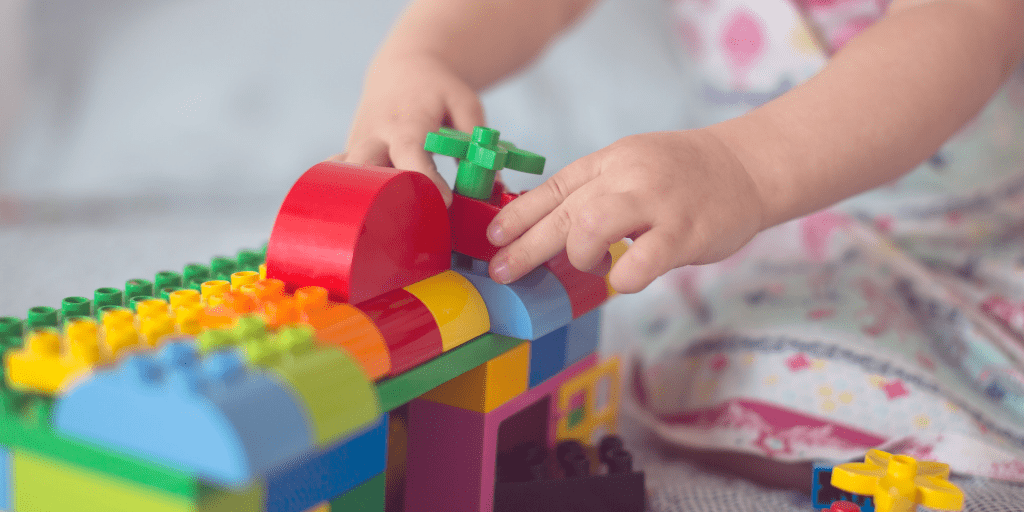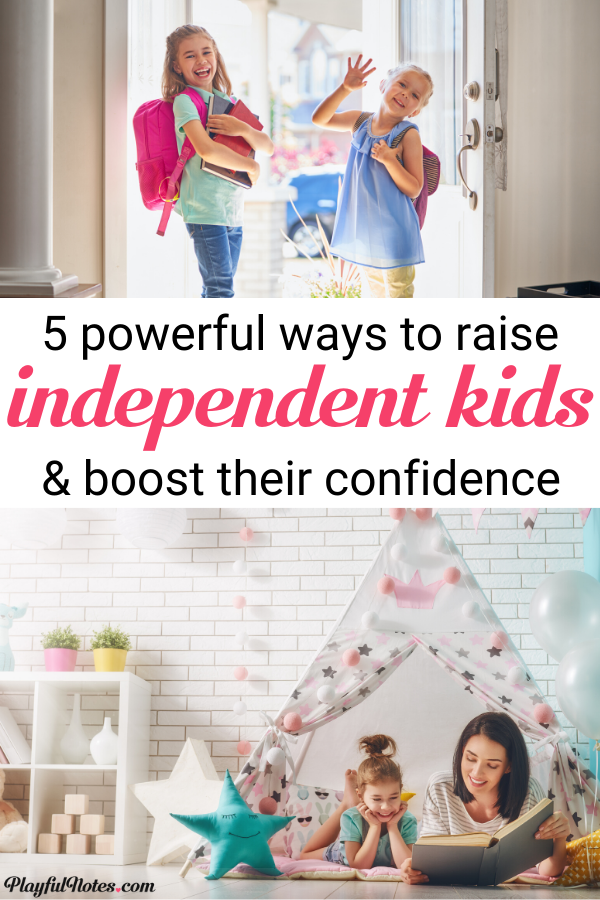The 5 powerful things that will help your child be more independent
This post may contain affiliate links. Read my whole disclosure here.
Inside: Discover 5 powerful tips that will help you raise an independent child. They are easy to put into practice and will make a big difference in your child’s life!

When my son was almost 3 years old, we lived in an apartment building that had a grocery store on the ground floor. It was a very little store, and we stopped there often on our way home.
My son loved that store because it wasn’t crowded like the big supermarkets and he knew where everything was on the shelves. Every time we went there I allowed him to carry the shopping basket (that had little wheels that made this easy for him) and put the groceries in it.
Usually, we were the only ones at the checkout line, so I let him put the groceries on the counter one by one. It was not an easy task for him, so it took a while for him to do this. The lady at the checkout desk would always give us a strange look, probably wondering why I never help him.
My son also liked to pay by himself, so I tried to always have cash in my wallet when we went there. He handed the money with a big smile on his face and waited patiently for the change.
One day he received a lot of coins, and he was very excited about it! It was difficult to pick them up from the counter with his little hands, but he was determined to do it. As I waited patiently for him to finish what he was doing the lady looked at me with a reproachful look. There was no one else waiting in line, so I saw no reason to intervene, so I just ignored her look, and two minutes later we were out of the store with my son proudly carrying his little pile of coins.
Then, a few weeks later, soon after my son turned 3, we were heading home, and he asked me to stop by the grocery shop.
I told him that we don’t need anything, but he insisted. We entered the store, and he told me that he wants to buy something on his own. I was totally surprised, but I was also very curious to see what was on his mind.
I gave him some money, and he headed to the dairy shelves asking me to wait for him right there, at the entrance. Even though I could see him from the entrance, it felt strange to let him walk through the store alone, but I agreed because there was no one else there and I could easily supervise him.
A few minutes later he came back to the checkout line with 3 things in his basket: a yogurt, a little bottle of kefir, and a small bread. He put them on the counter and waited for the lady behind it to scan them. Then he took the money out of his pocket and handed them to her. I could clearly see the amazement on her face.
My son put the change in his pocket and took the bag with his groceries. The lady kept smiling at him and gave him a high-five before he left.
I felt so proud of him!
The next day, in the afternoon, as I was returning from the office, I stopped by the store alone. The lady that gave me that reproachful look a few weeks before greeted me with a big smile.
“You have such an independent boy!”, she said. “Now I understand why you never helped him. These kids learn so fast, don’t they?”
“That’s right!”, I said. “Kids are pretty amazing!”
I realized that evening that she saw my lack of involvement as a lack of support for my son. This is why she judged me and looked at me that way before. As soon as she saw the benefits of my approach she understood that I wasn’t an unsupportive mom. On the contrary, what I did was my way to supporting my son in his desire to do things on his own.
And this is what’s really great about kids: The more confidence we have in their abilities, the more amazed we’ll be with their achievements! The more opportunities we offer them to try to do new things, the more confident they become in their success. The more we encourage them to keep trying, the more skills they will be able to acquire.
5 important things for raising an independent child
Ever since my son was a toddler people would often tell me that he is such an independent child. And the truth is that I really tried to find ways to help him be independent and confident.
Because I often get questions about the things that helped us encourage his independence, I decided to share with you today the most important tips that made a difference for us.
1. Build a strong connection and respond to the child’s needs
One of the most surprising things that I learned about independence in children is the fact that it has its roots in the child’s dependence on their parents. It might seem strange at first, but there is an entire attachment theory behind this conclusion.
When kids are babies, they depend entirely on their parents. This is why they need to feel that the parent responds to their needs. If they receive the love and attention they need they feel safe, and a healthy attachment is formed.
As the kids grow up, they still need to be connected with the parent to feel confident and safe. Toddlers have a natural desire to explore the world around them and to learn new things. But they can only do this if their attachment needs are met.
If kids know that they can count on their parents to offer them support, guidance, and comfort every time they need it, they will shift their focus towards exploring new things and developing new skills. If they don’t feel this, they become more dependent and clingy because they feel that huge need to build a connection with the parent.
The need for connection is more important for the child than the need for independence. So for the child to be able to act on their need for independence in a confident way, the child needs to feel the connection first.
This is why many strategies that suggest “pushing” the child towards independence fail. The best way to raise an independent child is to make sure that their emotional needs are met.
Offer hugs, let them cuddle in your arms, comfort them when they are upset. Your love is the best foundation for your child’s independence.
 photo credit: evgenyataman / depositphotos.com
photo credit: evgenyataman / depositphotos.com
2. Give your child responsibilities from an early age
Young children are capable of doing many great things if they are encouraged to do them. This is why offering household tasks to the kids is a very effective way to make them feel more confident in their abilities.
But for chores to really have this positive impact you need to use a playful approach. Young kids need to see their responsibilities as opportunities to learn new things. They need to have fun doing them.
Instead of transforming chores in a reason for unnecessary power struggles, use them as a tool for developing your child’s independence.
The best way that I discovered for doing this is implementing family contributions.
For us, using this approach was an instant win. I started to see cooperation instead of refusals and complaints. My son is glad to contribute, and we all feel more connected!
This is one of the things that I love most about family contributions: They bring more cooperation and connection and put an end to power struggles and unnecessary negotiations. If you want to try this idea with your kids, you can find all the tips for implementing family contributions here.
 photo credit: Maria Sbytova / shutterstock.com
photo credit: Maria Sbytova / shutterstock.com
3. Stop doing things that your kids can do on their own
This was a hard lesson to learn for me. I am an impatient person so waiting for my son to get dressed on himself seemed to take forever! I often intervened to speed up the process although I realized that he needed to practice.
The same thing happened with many other tasks that he did. I was often tempted to help him because that made things a lot quicker.
But I realized that this only made him feel less confident and transformed him into a lazier child. So I took a step back and decided to “force” myself to have more patience.
This doesn’t mean that I don’t help him when he asks for help. I know that helping him is beneficial as long as I see that he is trying and not just relying on me to do things for him.
We are still working on finding the best balance between allowing him to be independent and offering him the support that he needs. But I feel that we are heading in the right direction.
The best motivation for me in this process is this quote by Maria Montessori: “Never help a child with a task at which he feels he can succeed”. This is such a precious lesson for every parent!
4. Resist the temptation to entertain your child all the time
As parents, we are sometimes tempted to entertain our kids and to prevent them from getting bored. But the truth is that science shows that boredom is good for kids (here is why).
Kids need to learn to find their own ways to have fun and spend their time. This allows them to develop their creativity and become more independent.
This also applies to the number of toys the kids have. Research shows that having fewer toys is beneficial for children. It helps them focus better on what they are doing and not rely on adults to offer them entertainment options all the time.
 photo credit: Natalia Lebedinskaia / shutterstock.com
photo credit: Natalia Lebedinskaia / shutterstock.com
5. When things get hard, encourage your child to keep trying
Your child’s journey towards independence requires a lot of patience and support from your side. Your child needs to learn how to keep trying instead of giving up when they face a challenge. This is a very important skill to teach children because it has a big impact on their future.
A child who has a growth mindset and is determined to overcome failures has bigger chances to succeed in life and become a confident and independent person.
If you want to develop these skill in your child, here are some resources that can help you:
- How to help kids develop a growth mindset (and why this is important)
- 5 powerful ways to help a child who gives up easily
- The best activities and resources that will help kids develop a growth mindset.
At the end of this post, here is another quote that can be a great motivation on this journey of raising an independent child: “It’s not what you do for our children but what you have taught them to do for themselves that will make them successful human beings.” (Ann Landers)
>> Want to remember these ideas? Share them to your favorite Pinterest board!

photo credit preview photo: Elena Nasledova / shutterstock.com

Yes, so many good tips to build independence. I think the biggest stumbling block for most parents is that they often get caught up in but I can do it faster instead of realizing that is only true for the short term.